RYU基础整理
1. RYU结构,源码
1.1 RYU文件目录
下面介绍ryu/ryu目录下的主要目录内容。

base
base中有一个非常重要的文件:app_manager.py,其作用是RYU应用的管理中心。用于加载RYU应用程序,接受从APP发送过来的信息,同时也完成消息的路由。
其主要的函数有app注册、注销、查找、并定义了RYUAPP基类,定义了RYUAPP的基本属性。包含name, threads, events, event_handlers和observers等成员,以及对应的许多基本函数。如:start(), stop()等。
这个文件中还定义了AppManager基类,用于管理APP。定义了加载APP等函数。不过如果仅仅是开发APP的话,这个类可以不必关心。
controller——实现controller和交换机之间的互联和事件处理
controller文件夹中许多非常重要的文件,如events.py, ofp_handler.py, controller.py等。其中controller.py中定义了OpenFlowController基类。用于定义OpenFlow的控制器,用于处理交换机和控制器的连接等事件,同时还可以产生事件和路由事件。其事件系统的定义,可以查看events.py和ofp_events.py。
在ofp_handler.py中定义了基本的handler(应该怎么称呼呢?句柄?处理函数?),完成了基本的如:握手,错误信息处理和keep alive 等功能。更多的如packet_in_handler应该在app中定义。
在dpset.py文件中,定义了交换机端的一些消息,如端口状态信息等,用于描述和操作交换机。如添加端口,删除端口等操作。
lib——网络基本协议的实现和使用
lib中定义了我们需要使用到的基本的数据结构,如dpid, mac和ip等数据结构。在lib/packet目录下,还定义了许多网络协议,如ICMP, DHCP, MPLS和IGMP等协议内容。而每一个数据包的类中都有parser和serialize两个函数。用于解析和序列化数据包。
lib目录下,还有ovs, netconf目录,对应的目录下有一些定义好的数据类型,不再赘述。
ofproto
在这个目录下,基本分为两类文件,一类是协议的数据结构定义,另一类是协议解析,也即数据包处理函数文件。如ofproto_v1_0.py是1.0版本的OpenFlow协议数据结构的定义,而ofproto_v1_0_parser.py则定义了1.0版本的协议编码和解码。
topology——交换机和链路的查询模块
包含了switches.py等文件,基本定义了一套交换机的数据结构。event.py定义了交换上的事件。dumper.py定义了获取网络拓扑的内容。最后api.py向上提供了一套调用topology目录中定义函数的接口。
contrib——第三方库
这个文件夹主要存放的是开源社区贡献者的代码。
cmd——入口函数
定义了RYU的命令系统,为controller的执行创建环境,接收和处理相关命令
services
完成了BGP和vrrp的实现。
tests
tests目录下存放了单元测试以及整合测试的代码。
1.2 RYU 架构
RYU SDN 架构:
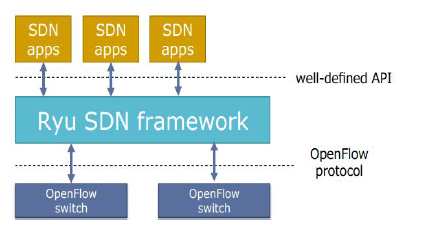

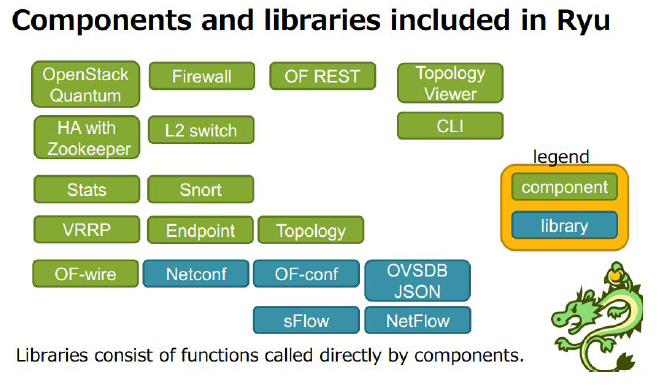
组件功能:
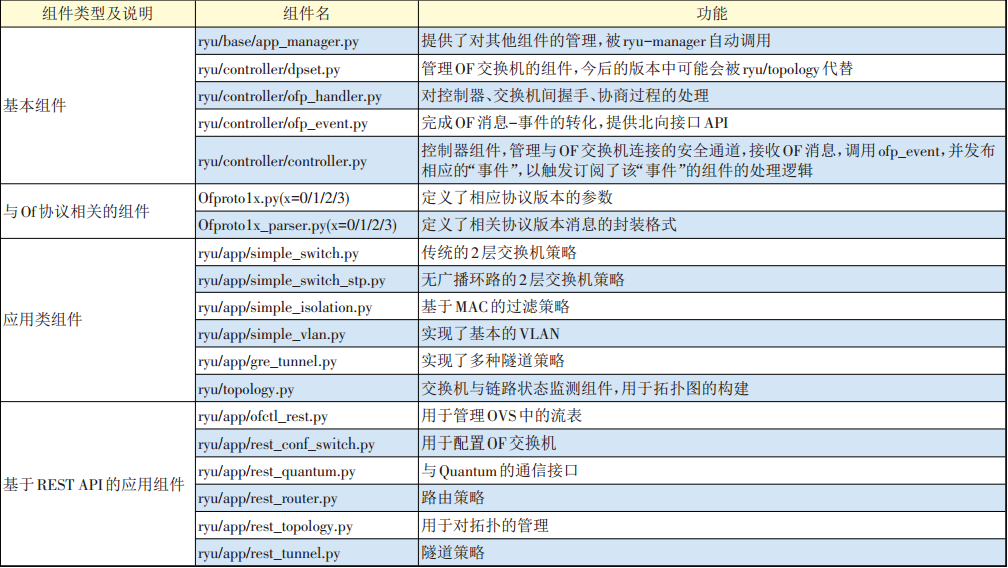
1.3 应用程序编程模型
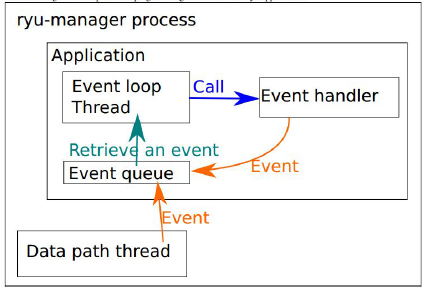
Ryu 事件处理、进程与线程:
1) Applications:该类继承自ryu.base.app_manager.RyuApp,用户逻辑被描述为一个APP。
2) Event : 继承自ryu.controller.event.EventBase , 应用程序之间的通信由transmitting and receiving events 完成。
3) Event Queue:每一个application 都有一个队列用于接收事件。
4) Threads:Ryu 使用第三方库eventlets 运行多线程。因为线程是非抢占式的,因此,当执行耗时的处理程序时要非常小心。
5) Event loops: 创建一个application 时,会自动生成一个线程,该线程运行一个事件循环。当队列事件不为空时,这个事件循环会加载该事件并且调用相应的事件处理函数(注册之后)。
6) Additional threads:可以使用hub.spawn()添加其它线程,用来处理特殊的应用
7) Eventlets:这是一个第三方库,里面的库函数被封装到hub 模块中被开发人员加载使用。【提供线程和事件队列的实现】
8) Event handlers:使用ryu.controller.handler.set_ev_cls 修饰一个事件处理函数。当该类型的事件触发后,事件处理函数就会被应用程序的事件循环调用。
1.4 OpenFlow的解析和封装
Ofp_handler
负责底层数据通信的模块是ofp\_handler模块。ofp\_handler启动之后,start函数实例化了一个controller.OpenFlowController实例。OpenFlowController实例化之后,立即调用\__call\__()函数,call函数启动了server\_loop去创建server socket,其handler为domain\_connection\_factory函数。每当收到一个switch连接,domain\_connection\_factory就会实例化一个datapath对象。这个对象用于描述交换机的所有行为。其中定义了接收循环和发送循环。
Datapath
datapath.serve函数是socket通信收发逻辑的入口。该函数启动了一个绿色线程去处理发送循环,然后本线程负责接收循环的处理。self.\_send\_loop是发送主循环。其主要逻辑为:不断获取发送队列是否有数据,若有,则发送;底层调用的是socket.send\_all()函数。
def serve(self):
send_thr = hub.spawn(self._send_loop) # send hello message immediately
hello = self.ofproto_parser.OFPHello(self)
self.send_msg(hello) try:
self._recv_loop()
finally:
hub.kill(send_thr)
hub.joinall([send_thr])
接收函数\_reck\_loop中实现了数据的接收和解析。
@_deactivate
def _recv_loop(self):
buf = bytearray() #初始化一个字节数组
required_len = ofproto_common.OFP_HEADER_SIZE # ofproto_common模块定义了OpenFlow常用的公共属性
# 如报头长度=8
count = 0
while self.is_active:
ret = self.socket.recv(required_len)
if len(ret) == 0:
self.is_active = False
break
buf += ret
while len(buf) >= required_len:
# ofproto_parser是在Datapath实例的父类ProtocolDesc的属性。
# 用于寻找对应协议版本的解析文件,如ofproto_v1_0_parser.py
# header函数是解析报头的函数。定义在ofproto_parser.py。
(version, msg_type, msg_len, xid) = ofproto_parser.header(buf)
required_len = msg_len
if len(buf) < required_len:
break
# ofproto_parser.msg的定义并没有在对应的ofproto_parser中
# msg函数的位置和header函数位置一样,都在ofproto_parser.py中。
# msg返回的是解析完成的消息。
# msg函数返回了msg_parser函数的返回值
# ofproto_parser.py中的_MSG_PARSERS记录了不同版本对应的msg_parser。其注册手法是通过@ofproto_parser.register_msg_parser(ofproto.OFP_VERSION)装饰器。
# 在对应版本的ofproto_parser,如ofproto_v1_0_parser.py中,都有定义一个同名的_MSG_PARSERS字典,这个字典用于记录报文类型和解析函数的关系。此处命名不恰当,引入混淆。
# parser函数通过@register_parser来将函数注册/记录到_MSG_PARSERS字典中。 msg = ofproto_parser.msg(self,
version, msg_type, msg_len, xid, buf)
# LOG.debug('queue msg %s cls %s', msg, msg.__class__)
if msg:
# Ryu定义的Event system很简单,在报文名前加上前缀“Event”,即是事件的名称。
# 同时此类系带msg信息。
# 使用send_event_to_obserevrs()函数将事件分发给监听事件的handler,完成事件的分发。
ev = ofp_event.ofp_msg_to_ev(msg)
self.ofp_brick.send_event_to_observers(ev, self.state) dispatchers = lambda x: x.callers[ev.__class__].dispatchers
# handler的注册是通过使用controller.handler.py文件下定义的set_ev_handler作为装饰器去注册。
# self.ofp_brick在初始化时,由注册在服务列表中查找名为"ofp_event"的模块赋值。
# ofp_handler模块的名字为"ofp_event",所以对应的模块是ofp_handler
handlers = [handler for handler in
self.ofp_brick.get_handlers(ev) if
self.state in dispatchers(handler)]
for handler in handlers:
handler(ev) buf = buf[required_len:]
required_len = ofproto_common.OFP_HEADER_SIZE # We need to schedule other greenlets. Otherwise, ryu
# can't accept new switches or handle the existing
# switches. The limit is arbitrary. We need the better
# approach in the future.
count += 1
if count > 2048:
count = 0
hub.sleep(0)
OpenFlow协议实现
OpenFlow协议解析部分代码大部分在ofproto目录下,少部分在controller目录下。首先介绍ofproto目录下的源码内容,再介绍controller目录下的ofp_event文件。
__init__
首先,__init__.py并不为空。该文件定义了两个功能类似的函数get_ofp_module()和get_ofp_modules(),前者用于取得协议版本对应的协议定义文件和协议解析模块,后者则取出整个字典。对应的字典在ofproto_protocol模块中定义。
ofproto\_protocol
在ofproto\_protocol定义了\_versions字典,具体如下:
_versions = {
ofproto_v1_0.OFP_VERSION: (ofproto_v1_0, ofproto_v1_0_parser),
ofproto_v1_2.OFP_VERSION: (ofproto_v1_2, ofproto_v1_2_parser),
ofproto_v1_3.OFP_VERSION: (ofproto_v1_3, ofproto_v1_3_parser),
ofproto_v1_4.OFP_VERSION: (ofproto_v1_4, ofproto_v1_4_parser),
}
除此之外,该文件还定义了Datapath的父类ProtocolDesc,此类基本上只完成了与协议版本相关的内容。该类最重要的两个成员是self.ofproto和self.ofproto\_parser,其值指明所本次通信所使用的OpenFlow协议的版本以及对应的解析模块。
ofproto\_common
ofproto\_common文件比较简单,主要定义了OpenFlow需要使用的公共属性,如监听端口,报头长度,报头封装格式等内容。
ofproto\_parser
ofproto\_parser文件定义了所有版本都需要的解析相关的公共属性。如定义了最重要的基类MsgBase(StringifyMixin)。
StringifyMixin类的定义在lib.stringify文件,有兴趣的读者可自行查看。MsgBase基类定义了最基础的属性信息,具体如下所示:
@create_list_of_base_attributes
def __init__(self, datapath):
super(MsgBase, self).__init__()
self.datapath = datapath
self.version = None
self.msg_type = None
self.msg_len = None
self.xid = None
self.buf = None
此外,该类还定义了基础的parser函数和serialize函数。基础的parser函数基本什么都没有做,仅返回一个赋值后的消息体。
@classmethod
def parser(cls, datapath, version, msg_type, msg_len, xid, buf):
msg_ = cls(datapath)
msg_.set_headers(version, msg_type, msg_len, xid)
msg_.set_buf(buf)
return msg_
serialize函数分为3部分,self.\_serialize\_pre(), self.\_serialize\_body()和self.\_serialize\_header()。本质上完成了header的序列化。关于body的序列化,将在对应的派生类中得到重写。
ofproto_v1_0
以1.0版本为例介绍ofproto\_v1\_x.py文件的作用。由于Ryu支持多版本的OpenFlow,所以在ofproto目录下,定义了从1.0到1.5版本的所有代码实现。所以其文件命名为ofproto\_v1_x.py,x从[1,2,3,4,5]中获得,分别对应相应的协议版本。
此类文件最重要的一个目的是定义了所有需要的静态内容,包括某字段的所有选项以及消息封装的格式以及长度。与OpenFlow消息内容相关的有协议的类型,动作的类型,port的类型等。此外对应每一个报文,都需要定义其封装的格式,以及封装的长度。Ryu采用了Python的Struct库去完成数据的解封装工作,关于Struct的介绍将在后续内容介绍。具体定义内容举例如下:
# enum ofp_port
OFPP_MAX = 0xff00
OFPP_IN_PORT = 0xfff8 # Send the packet out the input port. This
# virtual port must be explicitly used
# in order to send back out of the input
# port.
OFPP_TABLE = 0xfff9 # Perform actions in flow table.
# NB: This can only be the destination
# port for packet-out messages.
OFPP_NORMAL = 0xfffa # Process with normal L2/L3 switching.
OFPP_FLOOD = 0xfffb # All physical ports except input port and
# those disabled by STP.
OFPP_ALL = 0xfffc # All physical ports except input port.
OFPP_CONTROLLER = 0xfffd # Send to controller.
OFPP_LOCAL = 0xfffe # Local openflow "port".
OFPP_NONE = 0xffff # Not associated with a physical port. # enum ofp_type
OFPT_HELLO = 0 # Symmetric message
OFPT_ERROR = 1 # Symmetric message
OFPT_ECHO_REQUEST = 2 # Symmetric message
OFPT_ECHO_REPLY = 3 # Symmetric message
OFPT_VENDOR = 4 # Symmetric message
OFPT_FEATURES_REQUEST = 5 # Controller/switch message
OFPT_FEATURES_REPLY = 6 # Controller/switch message
OFPT_GET_CONFIG_REQUEST = 7 # Controller/switch message
OFPT_GET_CONFIG_REPLY = 8 # Controller/switch message
OFPT_SET_CONFIG = 9 # Controller/switch message
OFPT_PACKET_IN = 10 # Async message
OFPT_FLOW_REMOVED = 11 # Async message
OFPT_PORT_STATUS = 12 # Async message
OFPT_PACKET_OUT = 13 # Controller/switch message
OFPT_FLOW_MOD = 14 # Controller/switch message
OFPT_PORT_MOD = 15 # Controller/switch message
OFPT_STATS_REQUEST = 16 # Controller/switch message
OFPT_STATS_REPLY = 17 # Controller/switch message
OFPT_BARRIER_REQUEST = 18 # Controller/switch message
OFPT_BARRIER_REPLY = 19 # Controller/switch message
OFPT_QUEUE_GET_CONFIG_REQUEST = 20 # Controller/switch message
OFPT_QUEUE_GET_CONFIG_REPLY = 21 # Controller/switch message OFP_HEADER_PACK_STR = '!BBHI'
OFP_HEADER_SIZE = 8
OFP_MSG_SIZE_MAX = 65535
assert calcsize(OFP_HEADER_PACK_STR) == OFP_HEADER_SIZE
OFP\_HEADER\_PACK\_STR = '!BBHI'的意思是将header按照8|8|16|32的长度封装成对应的数值。在Python中分别对应的是1个字节的integer|一个字节的integer|2个字节的integer|4个字节的integer。
calcsize函数用于计算对应的format的长度。
ofproto_v1_0_parser
本模块用于定义报文的解析等动态内容。模块中定义了与OpenFlow协议对应的Common\_struct及message type对应的类。每一个message对应的类都是有MsgBase派生的,其继承了父类的parser函数和serialize函数。若报文无消息体,如Hello报文,则无需重写parser和serialize函数。
本模块定义了几个重要的全局函数:\_set\_msg\_type,\_register\_parser,msg\_parser和\_set\_msg\_reply。其作用介绍如下:
- _set_msg_type: 完成类与ofproto模块中定义的报文名字的映射,原因在于ofproto模块定义的名字并不是类名,而解析时需要使用ofproto中的名字。
- _register_parser:完成对应的类与类中的parser函数的映射,当解析函数从ofproto模块的名字映射到类之后,若需要解析,则需从类对应到对应的解析函数。parser函数是一个类函数,所以在使用时必须传入对应的类的对象作为参数。
- msg_parser:从_MSG_PARSERS中获取对msg_type的parser,并返回解析之后的内容。
- _set_msg_reply:完成该类与对应的回应报文的映射。
def _set_msg_type(msg_type):
'''Annotate corresponding OFP message type'''
def _set_cls_msg_type(cls):
cls.cls_msg_type = msg_type
return cls
return _set_cls_msg_type def _register_parser(cls):
'''class decorator to register msg parser'''
assert cls.cls_msg_type is not None
assert cls.cls_msg_type not in _MSG_PARSERS
_MSG_PARSERS[cls.cls_msg_type] = cls.parser
return cls @ofproto_parser.register_msg_parser(ofproto.OFP_VERSION)
def msg_parser(datapath, version, msg_type, msg_len, xid, buf):
parser = _MSG_PARSERS.get(msg_type)
return parser(datapath, version, msg_type, msg_len, xid, buf) def _set_msg_reply(msg_reply):
'''Annotate OFP reply message class'''
def _set_cls_msg_reply(cls):
cls.cls_msg_reply = msg_reply
return cls
return _set_cls_msg_reply
报文如果有消息体,则需要重写parser函数或者serialize函数,具体根据报文内容而不一样。此处,分别以Packet\_in和Flow\_mod作为parser的案例和serialize的案例,示例如下:
@_register_parser
@_set_msg_type(ofproto.OFPT_PACKET_IN)
class OFPPacketIn(MsgBase):
def __init__(self, datapath, buffer_id=None, total_len=None, in_port=None,
reason=None, data=None):
super(OFPPacketIn, self).__init__(datapath)
self.buffer_id = buffer_id
self.total_len = total_len
self.in_port = in_port
self.reason = reason
self.data = data @classmethod
def parser(cls, datapath, version, msg_type, msg_len, xid, buf):
# 解析头部,获取msg
msg = super(OFPPacketIn, cls).parser(datapath, version, msg_type,
msg_len, xid, buf)
# 解析body,获取packet_in相关字段。
(msg.buffer_id,
msg.total_len,
msg.in_port,
msg.reason) = struct.unpack_from(
ofproto.OFP_PACKET_IN_PACK_STR,
msg.buf, ofproto.OFP_HEADER_SIZE)
# 将ofproto.OFP_PACKET_IN_SIZE长度之外的buf内容,赋值给data
msg.data = msg.buf[ofproto.OFP_PACKET_IN_SIZE:]
if msg.total_len < len(msg.data):
# discard padding for 8-byte alignment of OFP packet
msg.data = msg.data[:msg.total_len]
return msg @_set_msg_type(ofproto.OFPT_FLOW_MOD)
class OFPFlowMod(MsgBase):
def __init__(self, datapath, match, cookie, command,
idle_timeout=0, hard_timeout=0,
priority=ofproto.OFP_DEFAULT_PRIORITY,
buffer_id=0xffffffff, out_port=ofproto.OFPP_NONE,
flags=0, actions=None):
if actions is None:
actions = []
super(OFPFlowMod, self).__init__(datapath)
self.match = match
self.cookie = cookie
self.command = command
self.idle_timeout = idle_timeout
self.hard_timeout = hard_timeout
self.priority = priority
self.buffer_id = buffer_id
self.out_port = out_port
self.flags = flags
self.actions = actions def _serialize_body(self):
offset = ofproto.OFP_HEADER_SIZE
self.match.serialize(self.buf, offset)
# 封装的起点是offset
offset += ofproto.OFP_MATCH_SIZE
# 按照ofproto.OFP_FLOW_MOD_PACK_STR0的格式,将对应的字段封装到self.buf中
msg_pack_into(ofproto.OFP_FLOW_MOD_PACK_STR0, self.buf, offset,
self.cookie, self.command,
self.idle_timeout, self.hard_timeout,
self.priority, self.buffer_id, self.out_port,
self.flags) offset = ofproto.OFP_FLOW_MOD_SIZE
if self.actions is not None:
for a in self.actions:
# 序列化action
a.serialize(self.buf, offset)
offset += a.len
此模块代码量大,包括OpenFlow协议对应版本内容的完全描述。分类上可分为解析和序列化封装两个重点内容。读者在阅读源码时可根据需求阅读片段即可。
Inet & ether
这两个模块非常简单,ether定义了常用的以太网的协议类型及其对应的代码;inet定义了IP协议族中不同协议的端口号,如TCP=6。
oxm_field
在1.3等高版本OpenFlow中,使用到了oxm\_field的概念。oxm全称为OpenFlow Extensible Match。当OpenFlow逐渐发展成熟,flow的match域越来越多。然而很多通信场景下使用到的匹配字段很少,甚至只有一个。OXM是一种TLV格式,使用OXM可以在下发流表时仅携带使用到的match域内容,而放弃剩余的大量的match域。当使用的match域较少时,统计概率上会减少报文传输的字节数。
nx_match
该文件定义了nicira extensible match的相关内容。
ofp_event
这个模块的位置并不再ofproto,而位于controller目录下。controller模块下的event定义了基础的事件基类。ofp\_event模块完成了OpenFlow报文到event的生成过程。模块中定义了EventOFPMsgBase(event.EventBase)类和\_ofp\_msg\_name\_to\_ev\_name(msg\_name)等函数的定义。相关函数都非常的简单,可从函数名了解到其功能。示例代码如下:
def _ofp_msg_name_to_ev_name(msg_name):
return 'Event' + msg_name
Struct lib
Python的struct库是一个简单的,高效的数据封装\解封装的库。该库主要包含5个函数,介绍如下:
- struct.pack(fmt, v1, v2, ...): 将V1,V2等值按照对应的fmt(format)进行封装。
- struct.pack_into(fmt, buffer, offset, v1, v2, ...):将V1,V2等值按照对应的fmt(format)封装到buffer中,从初始位置offset开始。
- struct.unpack(fmt, string): 将string按照fmt的格式解封
- struct.unpack_from(fmt, buffer[offset=0,]): 按照fmt的格式,从offset开始将buffer解封。
- struct.calcsize(fmt): 计算对应的fmt的长度。
更详细的封装语法,请查看struct对应的链接。此处仅对常用语法进行介绍:
- !:大端存储
- c: char
- B: 一个字节长度,unsigned char.
- H:两个字节,16位
- I: 4个字节,int型
- Q: 64bits
- x: padding
- 3x:3个字节的padding
- 5s: 5字节的字符串
1.5 Ryu的处理流程
入口函数执行流程
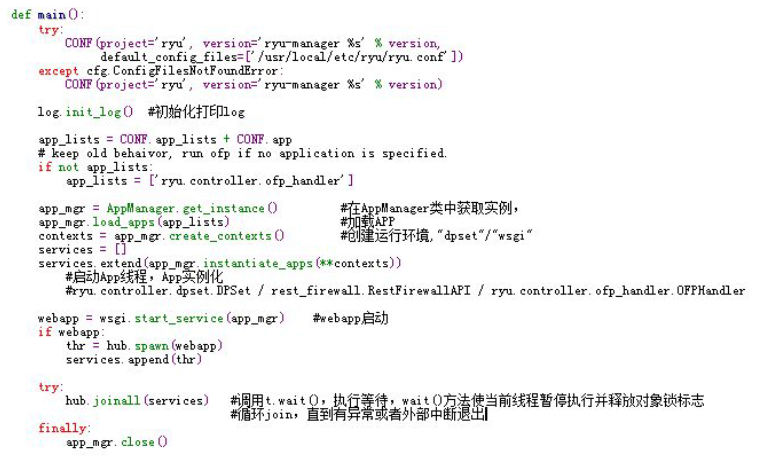
事件处理流程
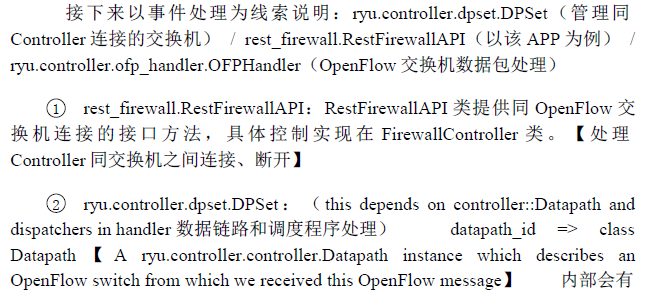


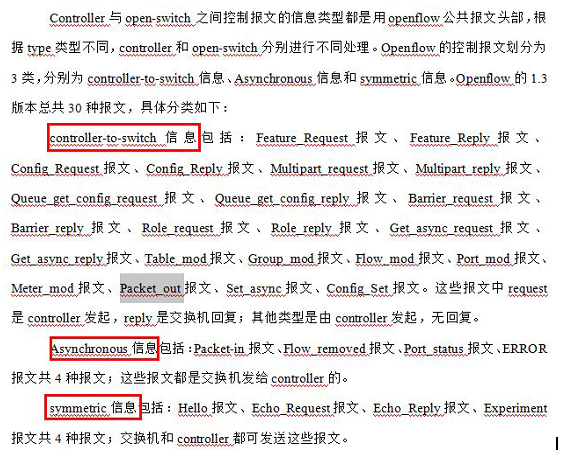

补充说明
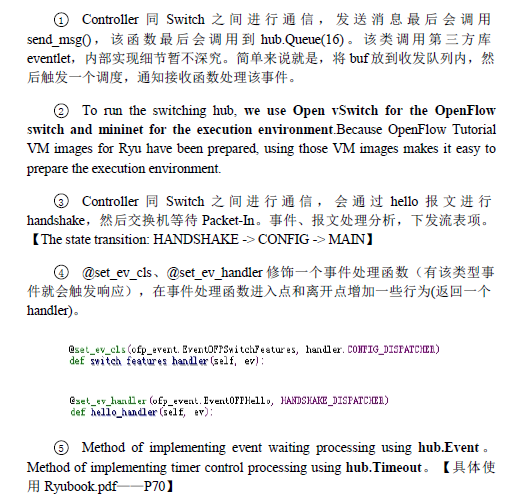
1.6 ryu运行
从main函数入手,讲述RYU的ryuapp基类细节、app_manager类如何load apps,注册并运行application,Event的产生以及分发,还有最重要的应用ofp_handler。
main()
RYU的main函数在ryu/cmd/manager.py文件中,部分内容如下:
def main(args=None, prog=None):
try:
CONF(args=args, prog=prog,
project='ryu', version='ryu-manager %s' % version,
default_config_files=['/usr/local/etc/ryu/ryu.conf'])
except cfg.ConfigFilesNotFoundError:
CONF(args=args, prog=prog,
project='ryu', version='ryu-manager %s' % version) log.init_log() #初始化打印log if CONF.pid_file:
import os
with open(CONF.pid_file, 'w') as pid_file:
pid_file.write(str(os.getpid())) app_lists = CONF.app_lists + CONF.app
# keep old behaivor, run ofp if no application is specified.
if not app_lists:
app_lists = ['ryu.controller.ofp_handler'] app_mgr = AppManager.get_instance() #在AppManager类中获取实例
app_mgr.load_apps(app_lists) #加载App
contexts = app_mgr.create_contexts() #创建运行环境,"dpset"/"wsgi"
services = []
services.extend(app_mgr.instantiate_apps(**contexts))
#启动App线程,App实例化
#ryu.controller.dpset.DPSet / rest_firewall.RestFirewallAPI / ryu.controller.ofp_handler.OFPHandler webapp = wsgi.start_service(app_mgr) #webapp启动
if webapp:
thr = hub.spawn(webapp)
services.append(thr) try:
hub.joinall(services) #调用t.wait(),执行等待,wait()方法使当前线程暂停执行并释放对象锁标志
#循环join,直到有异常或者外部中断推迟 finally:
app_mgr.close()
首先从CONF文件中读取出app list。如果ryu-manager 命令任何参数,则默认应用为ofp_handler应用。紧接着实例化一个AppManager对象,调用load_apps函数将应用加载。调用create_contexts函数创建对应的contexts, 然后调用instantiate_apps函数将app_list和context中的app均实例化。启动wsgi架构,提供web应用。最后将所有的应用作为任务,作为coroutine的task去执行,joinall使得程序必须等待所有的task都执行完成才可以退出程序。最后调用close函数,关闭程序,释放资源。以下的部分将以主函数中出现的调用顺序为依据,展开讲解。
OFPHandler
上文说到,如果没有捕获Application输入,那么默认启动的应用是OFPHandler应用。该应用主要用于处理OpenFlow消息。在start函数初始化运行了一个OpenFlowController实例。OpenFlowController类将在后续介绍。
def start(self):
super(OFPHandler, self).start()
return hub.spawn(OpenFlowController())
OFPHandler应用完成了基本的消息处理,如hello_handler:用于处理hello报文,协议版本的协商。其处理并不复杂,但是值得注意的一点是装饰器:Decorator的使用。
Decorator
Python修饰器的函数式编程 Python Decorator可以看作是一种声明,一种修饰。以下举例参考自Coolshell。举例如下:
@decorator
def foo():
pass
实际上等同于foo = decorator(foo), 而且它还被执行了。举个例子:
def keyword(fn):
print "you %s me!" % fn.__name__.upper() @keyword
def evol():
pass
运行之后,就会输出 you EVOL me
多个decorator:
@decorator_a
@decorator_b
def foo():
pass
这相当于:
foo = decorator_a(decorator_b(foo))
而带参数的decorator:
@decorator(arg1, arg2)
def foo():
pass
相当于
foo = decorator(arg1,arg2)(foo)
decorator(arg1,arg2)将生成一个decorator。
class式的 Decorator
class myDecorator(object):
def __init__(self, fn):
print "inside myDecorator.__init__()"
self.fn = fn
def __call__(self):
self.fn()
print "inside myDecorator.__call__()"
@myDecorator
def aFunction():
print "inside aFunction()"
print "Finished decorating aFunction()"
aFunction()
#结果:
>>>
inside myDecorator.__init__()
Finished decorating aFunction()
inside aFunction()
inside myDecorator.__call__()
>>>
@decorator使用时,__init__被调用,当function被调用是,执行__call__函数,而不执行function,所以在__call__函数中需要写出self.fn = fn,更多内容可以直接访问Python Decorator Library。
OpenFlowController
前一部分提到OFPHandle的start函数会将OpenFlowController启动。本小节介绍OpenFlowController类。该类的定义在ryu/cmd/controller.py文件中。OpenFlowController.__call__()函数启动了server_loop()函数,该函数实例化了hub.py中的StreamServer类,并将handler函数初始化为datapath_connection_factory函数,并调用serve_forever(),不断进行socket的监听。StreamServer定义如下:
class StreamServer(object):
def __init__(self, listen_info, handle=None, backlog=None,
spawn='default', **ssl_args):
assert backlog is None
assert spawn == 'default' if ':' in listen_info[0]:
self.server = eventlet.listen(listen_info,
family=socket.AF_INET6)
else:
self.server = eventlet.listen(listen_info)
if ssl_args:
def wrap_and_handle(sock, addr):
ssl_args.setdefault('server_side', True)
handle(ssl.wrap_socket(sock, **ssl_args), addr) self.handle = wrap_and_handle
else:
self.handle = handle def serve_forever(self):
while True:
sock, addr = self.server.accept()
spawn(self.handle, sock, addr)
Datapath
Datapath类在RYU中极为重要,每当一个datapath实体与控制器建立连接时,就会实例化一个Datapath的对象。 该类中不仅定义了许多的成员变量用于描述一个datapath,还管理控制器与该datapath通信的数据收发。其中_recv_loop函数完成数据的接收与解析,事件的产生与分发。
@_deactivate
def _recv_loop(self):
buf = bytearray()
required_len = ofproto_common.OFP_HEADER_SIZE count = 0
while self.is_active:
ret = self.socket.recv(required_len)
if len(ret) == 0:
self.is_active = False
break
buf += ret
while len(buf) >= required_len:
(version, msg_type, msg_len, xid) = ofproto_parser.header(buf)
required_len = msg_len
if len(buf) < required_len:
break msg = ofproto_parser.msg(self,
version, msg_type, msg_len, xid, buf) # 解析报文
# LOG.debug('queue msg %s cls %s', msg, msg.__class__)
if msg:
ev = ofp_event.ofp_msg_to_ev(msg) # 产生事件
self.ofp_brick.send_event_to_observers(ev, self.state) # 事件分发 dispatchers = lambda x: x.callers[ev.__class__].dispatchers
handlers = [handler for handler in
self.ofp_brick.get_handlers(ev) if
self.state in dispatchers(handler)]
for handler in handlers:
handler(ev) buf = buf[required_len:]
required_len = ofproto_common.OFP_HEADER_SIZE # We need to schedule other greenlets. Otherwise, ryu
# can't accept new switches or handle the existing
# switches. The limit is arbitrary. We need the better
# approach in the future.
count += 1
if count > 2048:
count = 0
hub.sleep(0)
@_deactivate修饰符作用在于在Datapath断开连接之后,将其状态is_active置为False。self.ofp_brick.send_event_to_observers(ev, self.state) 语句完成了事件的分发。self.brick的初始化语句可以在self.__init__函数中找到:
self.ofp_brick = ryu.base.app_manager.lookup_service_brick('ofp_event')
由上可知,self.ofp_brick实际上是由service_brick(中文可以成为:服务链表?)中的“ofp_event”服务赋值的。在每一个app中,使用@set_ev_cls(ev_cls,dispatchers)时,就会将实例化ofp_event模块,执行文件中最后一句:
handler.register_service('ryu.controller.ofp_handler')
register_service函数实体如下:
def register_service(service):
"""
Register the ryu application specified by 'service' as
a provider of events defined in the calling module. If an application being loaded consumes events (in the sense of
set_ev_cls) provided by the 'service' application, the latter
application will be automatically loaded. This mechanism is used to e.g. automatically start ofp_handler if
there are applications consuming OFP events.
""" frm = inspect.stack()[1]
m = inspect.getmodule(frm[0])
m._SERVICE_NAME = service
其中inspect.stack()[1]返回了调用此函数的caller, inspect.getmodule(frm[0])返回了该caller的模块,当前例子下,module=ofp_event。
我们可以通过ryu-manager --verbose来查看到输出信息,从而印证这一点。
:~/ryu/ryu/app$ ryu-manager --verbose
loading app ryu.controller.ofp_handler
instantiating app ryu.controller.ofp_handler of OFPHandler
BRICK ofp_event
CONSUMES EventOFPErrorMsg
CONSUMES EventOFPEchoRequest
CONSUMES EventOFPPortDescStatsReply
CONSUMES EventOFPHello
CONSUMES EventOFPSwitchFeatures
所以当运行ofp_handler应用时,就会注册ofp_event service,为后续的应用提供服务。分发事件之后,还要处理自身订阅的事件,所以首先找到符合当前state的caller,然后调用handler。_caller类可以在handler.py文件中找到,包含dispatchers和ev_source两个成员变量。前者用于描述caller需要的state,后者是event产生者的模块名称。
对应的发送循环由_send_loop完成。self.send_p是一个深度为16的发送queue。
@_deactivate
def _send_loop(self):
try:
while self.is_active:
buf = self.send_q.get()
self.socket.sendall(buf)
finally:
q = self.send_q
# first, clear self.send_q to prevent new references.
self.send_q = None
# there might be threads currently blocking in send_q.put().
# unblock them by draining the queue.
try:
while q.get(block=False):
pass
except hub.QueueEmpty:
pass
serve函数完成了发送循环的启动和接受循环的启动。启动一个coroutine去执行self._send_loop(), 然后马上主动发送hello报文到datapath(可以理解为交换网桥:Bridge),最后执行self._recv_loop()。
def serve(self):
send_thr = hub.spawn(self._send_loop) # send hello message immediately
hello = self.ofproto_parser.OFPHello(self)
self.send_msg(hello) try:
self._recv_loop()
finally:
hub.kill(send_thr)
hub.joinall([send_thr])
而serve函数又在datapath_connection_factory函数中被调用。当然向外提供完整功能的API就是这个。所以在OpenFlowController类中可以看到在初始化server实例的时候,handler赋值为datapath_connection_factory。其中使用到的contextlib module具体内容不作介绍,读者可自行学习。
def datapath_connection_factory(socket, address):
LOG.debug('connected socket:%s address:%s', socket, address)
with contextlib.closing(Datapath(socket, address)) as datapath:
try:
datapath.serve()
except:
# Something went wrong.
# Especially malicious switch can send malformed packet,
# the parser raise exception.
# Can we do anything more graceful?
if datapath.id is None:
dpid_str = "%s" % datapath.id
else:
dpid_str = dpid_to_str(datapath.id)
LOG.error("Error in the datapath %s from %s", dpid_str, address)
raise
到此为止,OFPHandler应用的功能实现介绍完毕。RYU启动时,需要启动OFPHandler,才能完成数据的收发和解析。更多的上层应用逻辑都是在此基础之上进行的。若要开发APP则需要继承RyuApp类,并完成observer监听事件,以及注册handler去完成事件处理。
RyuApp
RyuApp类是RYU封装好的APP基类,用户只需要继承该类,就可以方便地开发应用。而注册对应的observer和handler都使用@derocator的形式,使得开发非常的简单高效,这也是Python的优点之一吧。RyuApp类的定义在ryu/base/app_manager.py文件中。该文件实现了两个类RyuApp和AppManager。前者用于定义APP基类,为应用开发提供基本的模板,后者用于Application的管理,加载应用,运行应用,消息路由等功能。
app_manager.py文件中import了instpect和itertools module,从而使得开发更方便简洁。inspect模块提供了一些有用的方法,用于类型检测,获取内容,检测是否可迭代等功能。itertools则是一个关于迭代器的模块,可以提供丰富的迭代器类型,在数据处理上尤其有用。
_CONTEXT
这是一个极其难理解的概念。博主的理解是,_CONTEXT内存储着name:class的key value pairs。为什么需要存储这个内容?实际上这个_CONTEXT携带的信息是所有本APP需要依赖的APP。需要在启动本应用之前去启动,以满足依赖的,比如一个simple_switch.py的应用,如果没有OFPHandler应用作为数据收发和解析的基础的话,是无法运行的。具体文档如下:
_CONTEXTS = {}
"""
A dictionary to specify contexts which this Ryu application wants to use.
Its key is a name of context and its value is an ordinary class
which implements the context. The class is instantiated by app_manager
and the instance is shared among RyuApp subclasses which has _CONTEXTS
member with the same key. A RyuApp subclass can obtain a reference to
the instance via its __init__'s kwargs as the following.
Example::
_CONTEXTS = {
'network': network.Network
}
def __init__(self, *args, *kwargs):
self.network = kwargs['network']
"""
_EVENTS
用于记录本应用会产生的event。但是当且仅当定义该event的语句在其他模块时才会被使用到。
self.__init__
__init__函数中初始化了许多重要的成员变量,如self.event_handler用于记录向外提供的事件处理句柄,而self.observer则刚好相反,用于通知app_manager本应用监听何种类型的事件。self.event是事件队列。
def __init__(self, *_args, **_kwargs):
super(RyuApp, self).__init__()
self.name = self.__class__.__name__
self.event_handlers = {} # ev_cls -> handlers:list
self.observers = {} # ev_cls -> observer-name -> states:set
self.threads = []
self.events = hub.Queue(128)
if hasattr(self.__class__, 'LOGGER_NAME'):
self.logger = logging.getLogger(self.__class__.LOGGER_NAME)
else:
self.logger = logging.getLogger(self.name)
self.CONF = cfg.CONF # prevent accidental creation of instances of this class outside RyuApp
class _EventThreadStop(event.EventBase):
pass
self._event_stop = _EventThreadStop()
self.is_active = True
self.start
start函数将启动coroutine去处理_event_loop,并将其加入threads字典中。
self._event_loop
_event_loop函数用于启动事件处理循环,通过调用self.get_handlers(ev, state)函数来找到事件对应的handler,然后处理事件。
def get_handlers(self, ev, state=None):
"""Returns a list of handlers for the specific event. :param ev: The event to handle.
:param state: The current state. ("dispatcher")
If None is given, returns all handlers for the event.
Otherwise, returns only handlers that are interested
in the specified state.
The default is None.
"""
ev_cls = ev.__class__
handlers = self.event_handlers.get(ev_cls, [])
if state is None:
return handlers def _event_loop(self):
while self.is_active or not self.events.empty():
ev, state = self.events.get()
if ev == self._event_stop:
continue
handlers = self.get_handlers(ev, state)
for handler in handlers:
handler(ev)
event dispatch
应用中可以通过@set_ev_cls修饰符去监听某些事件。当产生event时,通过event去get observer,得到对应的观察者,然后再使用self.send_event函数去发送事件。在这里,实际上就是直接往self.event队列中put event。
def _send_event(self, ev, state):
self.events.put((ev, state)) def send_event(self, name, ev, state=None):
"""
Send the specified event to the RyuApp instance specified by name.
""" if name in SERVICE_BRICKS:
if isinstance(ev, EventRequestBase):
ev.src = self.name
LOG.debug("EVENT %s->%s %s" %
(self.name, name, ev.__class__.__name__))
SERVICE_BRICKS[name]._send_event(ev, state)
else:
LOG.debug("EVENT LOST %s->%s %s" %
(self.name, name, ev.__class__.__name__)) def send_event_to_observers(self, ev, state=None):
"""
Send the specified event to all observers of this RyuApp.
""" for observer in self.get_observers(ev, state):
self.send_event(observer, ev, state)
其他函数如注册handler函数:register_handler,注册监听函数:register_observer等都是非常简单直白的代码,不再赘述。
AppManager
AppManager类是RYU应用的调度中心。用于管理应用的添加删除,消息路由等等功能。
首先从启动函数开始介绍,我们可以看到run_apps函数中的代码和前文提到的main函数语句基本一样。首先获取一个对象,然后加载对应的apps,然后获取contexts,context中其实包含的是本应用所需要的依赖应用。所以在调用instantiate_apps函数时,将app_lists内的application和contexts中的services都实例化,然后启动协程去运行这些服务。
@staticmethod
def run_apps(app_lists):
"""Run a set of Ryu applications A convenient method to load and instantiate apps.
This blocks until all relevant apps stop.
"""
app_mgr = AppManager.get_instance()
app_mgr.load_apps(app_lists)
contexts = app_mgr.create_contexts()
services = app_mgr.instantiate_apps(**contexts)
webapp = wsgi.start_service(app_mgr)
if webapp:
services.append(hub.spawn(webapp))
try:
hub.joinall(services)
finally:
app_mgr.close()
load_apps
首先从创建一个apps_lists的生成器(个人理解应该是生成器而非迭代器)。在while循环中,每次pop一个应用进行处理,然后将其本身和其context中的内容添加到services中,再去调用get_dependent_services函数获取其依赖应用,最后将所有的依赖services添加到app_lists中,循环至最终app_lists内元素全都pop出去,完成application的加载。
def load_apps(self, app_lists):
app_lists = [app for app
in itertools.chain.from_iterable(app.split(',')
for app in app_lists)]
while len(app_lists) > 0:
app_cls_name = app_lists.pop(0) context_modules = map(lambda x: x.__module__,
self.contexts_cls.values())
if app_cls_name in context_modules:
continue LOG.info('loading app %s', app_cls_name) cls = self.load_app(app_cls_name)
if cls is None:
continue self.applications_cls[app_cls_name] = cls services = []
for key, context_cls in cls.context_iteritems():
v = self.contexts_cls.setdefault(key, context_cls)
assert v == context_cls
context_modules.append(context_cls.__module__) if issubclass(context_cls, RyuApp):
services.extend(get_dependent_services(context_cls)) # we can't load an app that will be initiataed for
# contexts.
for i in get_dependent_services(cls):
if i not in context_modules:
services.append(i)
if services:
app_lists.extend([s for s in set(services)
if s not in app_lists])
create_contexts
context实例化函数将context中name:service class键值对的内容实例化成对应的对象,以便加入到services 列表中,从而得到加载。首先从列表中取出对应数据,然后判断是否时RyuApp的子类,是则实例化,否则直接赋值service class。load_app函数在读取的时候还会再次判断是否是RyuApp子类。
def create_contexts(self):
for key, cls in self.contexts_cls.items():
if issubclass(cls, RyuApp):
# hack for dpset
context = self._instantiate(None, cls)
else:
context = cls()
LOG.info('creating context %s', key)
assert key not in self.contexts
self.contexts[key] = context
return self.contexts
instantiate_apps
此函数调用了self._instantiate函数,在_instantiate函数中又调用了register_app()函数,此函数将app添加到SERVICE_BRICKS字典之中,然后继续调用了ryu.controller.handler 中的 register_instance函数,最终完成了应用的注册。此后继续调用self._update_bricks函数完成了服务链表的更新,最后启动了所有的应用。
def instantiate_apps(self, *args, **kwargs):
for app_name, cls in self.applications_cls.items():
self._instantiate(app_name, cls, *args, **kwargs) self._update_bricks()
self.report_bricks() threads = []
for app in self.applications.values():
t = app.start()
if t is not None:
threads.append(t)
return threads def _instantiate(self, app_name, cls, *args, **kwargs):
# for now, only single instance of a given module
# Do we need to support multiple instances?
# Yes, maybe for slicing.
#LOG.info('instantiating app %s of %s', app_name, cls.__name__) if hasattr(cls, 'OFP_VERSIONS') and cls.OFP_VERSIONS is not None:
ofproto_protocol.set_app_supported_versions(cls.OFP_VERSIONS) if app_name is not None:
assert app_name not in self.applications
app = cls(*args, **kwargs)
register_app(app)
assert app.name not in self.applications
self.applications[app.name] = app
return app
_update_bricks
此函数完成了更新service_bricks的功能。首先从获取到service实例,然后再获取到service中的方法,若方法有callers属性,即使用了@set_ev_cls的装饰符,拥有了calls属性。(caller类中的ev_source和dispatcher成员变量描述了产生该event的source module, dispatcher描述了event需要在什么状态下才可以被分发。如:HANDSHAKE_DISPATCHER,CONFIG_DISPATCHER等。)最后调用register_observer函数注册了observer。
def _update_bricks(self):
for i in SERVICE_BRICKS.values():
for _k, m in inspect.getmembers(i, inspect.ismethod):
if not hasattr(m, 'callers'):
continue
for ev_cls, c in m.callers.iteritems():
if not c.ev_source:
continue brick = _lookup_service_brick_by_mod_name(c.ev_source)
if brick:
brick.register_observer(ev_cls, i.name,
c.dispatchers) # allow RyuApp and Event class are in different module
for brick in SERVICE_BRICKS.itervalues():
if ev_cls in brick._EVENTS:
brick.register_observer(ev_cls, i.name,
c.dispatchers)
ryu.controller.handler.register_instance
以上的部分介绍了App的注册,observer的注册,handler的查找和使用,但是,始终没有提到handler在何处注册。实际上,handler的注册在register_instance部分完成了。为什么他的位置在handler文件,而不在app_manager文件呢?个人认为可能是为了给其他非Ryu APP的模块使用吧。
def register_instance(i):
for _k, m in inspect.getmembers(i, inspect.ismethod):
# LOG.debug('instance %s k %s m %s', i, _k, m)
if _has_caller(m):
for ev_cls, c in m.callers.iteritems():
i.register_handler(ev_cls, m)
2. RYU实践
2.1 二层交换机
http://ryu.readthedocs.org/en/latest/writing_ryu_app.html
第一步:
ryu.base import app_manager:该文件中定义了RyuApp基类,开发APP需要继承该基类;
保存为L2Switch.py 运行: ryu-manager L2Switch.py
from ryu.base import app_manager class L2Switch(app_manager.RyuApp):
def __init__(self, *args, **kwargs):
super(L2Switch, self).__init__(*args, **kwargs)
第二步:
ofp_event完成了事件的定义,从而我们可以在函数中注册handler,监听事件,并作出回应。
packet_in_handler方法用于处理packet_in事件。
@set_ev_cls修饰符用于告知RYU,被修饰的函数应该被调用。第一个参数表示事件发生时应该调用的函数,第二个参数告诉交换机只有在交换机握手完成之后,才可以被调用。
数据操作:
- ev.msg:每一个事件类ev中都有msg成员,用于携带触发事件的数据包。
- msg.datapath:已经格式化的msg其实就是一个packet_in报文,msg.datapath直接可以获得packet_in报文的datapath结构。datapath用于描述一个交换网桥。也是和控制器通信的实体单元。datapath.send_msg()函数用于发送数据到指定datapath。通过datapath.id可获得dpid数据,在后续的教程中会有使用。
- datapath.ofproto对象是一个OpenFlow协议数据结构的对象,成员包含OpenFlow协议的数据结构,如动作类型OFPP_FLOOD。
- datapath.ofp_parser则是一个按照OpenFlow解析的数据结构。
- actions是一个列表,用于存放action list,可在其中添加动作。
- 通过ofp_parser类,可以构造构造packet_out数据结构。括弧中填写对应字段的赋值即可。
如果datapath.send_msg()函数发送的是一个OpenFlow的数据结构,RYU将把这个数据发送到对应的datapath。
from ryu.base import app_manager
from ryu.controller import ofp_event
from ryu.controller.handler import MAIN_DISPATCHER
from ryu.controller.handler import set_ev_cls class L2Switch(app_manager.RyuApp):
def __init__(self, *args, **kwargs):
super(L2Switch, self).__init__(*args, **kwargs) @set_ev_cls(ofp_event.EventOFPPacketIn, MAIN_DISPATCHER)
def packet_in_handler(self, ev):
msg = ev.msg
datapath = msg.datapath
ofp = datapath.ofproto
ofp_parser = datapath.ofproto_parser actions = [ofp_parser.OFPActionOutput(ofp.OFPP_FLOOD)]
out = ofp_parser.OFPPacketOut(
datapath=datapath, buffer_id=msg.buffer_id, in_port=msg.in_port,
actions=actions)
datapath.send_msg(out)
第三步:
import struct
import logging from ryu.base import app_manager
from ryu.controller import mac_to_port
from ryu.controller import ofp_event
from ryu.controller.handler import MAIN_DISPATCHER
from ryu.controller.handler import set_ev_cls
from ryu.ofproto import ofproto_v1_0
from ryu.lib.mac import haddr_to_bin
from ryu.lib.packet import packet
from ryu.lib.packet import ethernet class L2Switch(app_manager.RyuApp): OFP_VERSIONS = [ofproto_v1_0.OFP_VERSION]#define the version of OpenFlow def __init__(self, *args, **kwargs):
super(L2Switch, self).__init__(*args, **kwargs)
self.mac_to_port = {} def add_flow(self, datapath, in_port, dst, actions):
ofproto = datapath.ofproto match = datapath.ofproto_parser.OFPMatch(
in_port = in_port, dl_dst = haddr_to_bin(dst)) mod = datapath.ofproto_parser.OFPFlowMod(
datapath = datapath, match = match, cookie = 0,
command = ofproto.OFPFC_ADD, idle_timeout = 10,hard_timeout = 30,
priority = ofproto.OFP_DEFAULT_PRIORITY,
flags =ofproto.OFPFF_SEND_FLOW_REM, actions = actions) datapath.send_msg(mod) @set_ev_cls(ofp_event.EventOFPPacketIn, MAIN_DISPATCHER)
def packet_in_handler(self, ev):
msg = ev.msg
datapath = msg.datapath
ofproto = datapath.ofproto pkt = packet.Packet(msg.data)
eth = pkt.get_protocol(ethernet.ethernet) dst = eth.dst
src = eth.src dpid = datapath.id #get the dpid
self.mac_to_port.setdefault(dpid, {}) self.logger.info("packet in %s %s %s %s", dpid, src, dst , msg.in_port)
#To learn a mac address to avoid FLOOD next time. self.mac_to_port[dpid][src] = msg.in_port out_port = ofproto.OFPP_FLOOD #Look up the out_port
if dst in self.mac_to_port[dpid]:
out_port = self.mac_to_port[dpid][dst] ofp_parser = datapath.ofproto_parser actions = [ofp_parser.OFPActionOutput(out_port)] if out_port != ofproto.OFPP_FLOOD:
self.add_flow(datapath, msg.in_port, dst, actions) #We always send the packet_out to handle the first packet.
packet_out = ofp_parser.OFPPacketOut(datapath = datapath, buffer_id = msg.buffer_id,
in_port = msg.in_port, actions = actions)
datapath.send_msg(packet_out)
#To show the message of ports' status.
@set_ev_cls(ofp_event.EventOFPPortStatus, MAIN_DISPATCHER)
def _port_status_handler(self, ev):
msg = ev.msg
reason = msg.reason
port_no = msg.desc.port_no ofproto = msg.datapath.ofproto if reason == ofproto.OFPPR_ADD:
self.logger.info("port added %s", port_no)
elif reason == ofproto.OFPPR_DELETE:
self.logger.info("port deleted %s", port_no)
elif reason == ofproto.OFPPR_MODIFY:
self.logger.info("port modified %s", port_no)
else:
self.logger.info("Illeagal port state %s %s", port_no, reason)
2.2 simple-switch.py 的APP测试
在mininet上模拟一台交换机(s1)三台主机(h1,h2,h3),然后远端连接RYU控制器,使用127.0.0.1,和6633端口建立连接
第一,在RYU控制器开启simple-switch.py的APP,输入命令:ryu-manager simple-switch.py:

然后在RYU的那个终端就会显示连接的建立,同时,也会同步一些交换机和控制器建立连接的信息,如图:
此时,在交换机的转发流表是空的,因此此时主机之间是不可以通信的,在使用h1去ping h2的时候,就会自动建立流表
注意是先进行广播,然后建立反方向的流表,然后建立正方向的流表。流表如图:
资料出处:
http://ryu.readthedocs.org/en/latest/api_ref.html
http://www.sdnlab.com/6395.html
http://www.sdnlab.com/12838.html
RYU基础整理的更多相关文章
- 机器学习 —— 基础整理(六)线性判别函数:感知器、松弛算法、Ho-Kashyap算法
这篇总结继续复习分类问题.本文简单整理了以下内容: (一)线性判别函数与广义线性判别函数 (二)感知器 (三)松弛算法 (四)Ho-Kashyap算法 闲话:本篇是本系列[机器学习基础整理]在time ...
- MySQL基础整理(一)之SQL基础(未完成)
大家好,我是浅墨竹染,以下是MySQL基础整理(一)之SQL基础 1.SQL简介 SQL(Structure Query Language)是一种结构化查询语言,是使用关系模型的数据库应用语言. 2. ...
- nutch的一些基础整理
nutch的一些基础整理 原创 2015年03月22日 18:18:01 标签: nutch / 240 编辑 删除 一.关于配置文件: nutch-default.xml:爬虫的默认配置.在${nu ...
- [转帖]nginx基础整理
nginx基础整理 https://www.cnblogs.com/guigujun/p/6588545.html 目录结构如下: Nginx基础知识 Nginx HTTP服务器的特色及优点 Ngin ...
- JAVA基础整理-集合篇(一)
集合作为JAVA的基础知识,本来感觉自己理解的很清楚了,但是在最近的一次面试中还是答得不尽如人意!再次做一下整理,以便加深理解以及随时查阅. 首先,java.util包中三个重要的接口及特点:List ...
- 关于JAVA面向对象基础整理以及个人的理解(适合初学者阅读)
JAVA的基础语法等都跟C有很大的相似之处,所以这里就不多啰嗦了.直接从数组开始. 数组: 1.声明 int [] a; 在声明的过程中,并没有分配空间给数组.我们可以在声明的同时,用new来分配相应 ...
- C#基础整理
元旦整理书架发现一本小册子——<C#精髓>中国出版社2001年出版的,粗略翻了下关于C#的知识点挺全的虽然内容谈得很浅也有很多过时的内容(话说这本书是我在旧书店花5块钱淘的)我保留原有章节 ...
- HTML5游戏开发技术基础整理
随着HTML5标准终于敲定.HTML5将有望成为游戏开发领域的的热门平台. HTML5游戏能够执行于包含iPhone系列和iPad系列在内的计算机.智能手机以及平板电脑上,是眼下跨平台应用开发的最佳实 ...
- js数组基础整理
首页: 主要整理了一下数组中常用的一些基础知识,代码都是自己手敲,有不对的地方希望能指出,目前只有4篇,后续会不断的增加这一板块. 由于少于100字不能发所以把一些最基本的创建数组也写上. // 创建 ...
随机推荐
- Java中的数据验证
原文链接:https://www.cuba-platform.com/blog/2018-10-09/945 翻译:CUBA China CUBA-Platform 官网 : https://www. ...
- Magento2开发教程 - 如何向数据库添加新表
Magento 2具有特殊的机制,允许你创建数据库表,修改现有的,甚至添加一些数据到他们(如安装数据,已被添加在模块安装). 这种机制允许这些变化可以在不同的设备之间传输. 关键的概念是,而不是做你能 ...
- UIWebView 展示GIF/image
代码: [web loadData:self.gifDataArr[index] MIMEType:@"image/gif" textEncodingName:@"&qu ...
- oracle中scott用户的创建
原创作品,转载请在文章开头显眼位置注明出处:https://www.cnblogs.com/sunshine5683/p/10046716.html 今天,接着上次的学习进度继续前进,在此过程中,使用 ...
- 使用CSS3改变文本选中的默认颜色——张鑫旭
关于浏览器文字选中颜色 以我的系统举例(xp 默认主题),浏览器上页面文字选中后默认的背景色是一种蓝色, 不同浏览器的颜色有些许差异,但大致相同,文字颜色也近乎白色,如下图所示,截自Firefox3. ...
- LINUX创建LVM、PV、VG、LV ORACLE服务器方案划分
为裸盘分区 查看硬盘分区 fdisk -l 进入分区管理 fdisk /dev/sda 创建PV 创建PV pvcreate /dev/sda1 pvcreate /dev/sdb1 pvcreate ...
- charles 抓包 https 证书
1. 概述 环境:这里是windows8 和 android (参考了ios环境的博客) 手机app点击发出http及https的请求,之前抓包都有请求的相关内容展示,这次没有,原来之前的一直抓的是h ...
- React之浅拷贝与深拷贝
最近发现的一个bug让我从react框架角度重新复习了一遍浅拷贝与深拷贝. 浅拷贝,就是两个变量都是指向一个地址,改变了一个变量,那另一个变量也随之改变.这就是浅拷贝带来的副作用,两个变量会相互影响到 ...
- Visualizing LSTM Layer with t-sne in Neural Networks
LSTM 可视化 Visualizing Layer Representations in Neural Networks Visualizing and interpreting represent ...
- Material适配1 - 入门篇
版权声明: 欢迎转载,但请保留文章原始出处 作者:GavinCT 出处:http://www.cnblogs.com/ct2011/p/4493384.html 随着Material Design的普 ...



